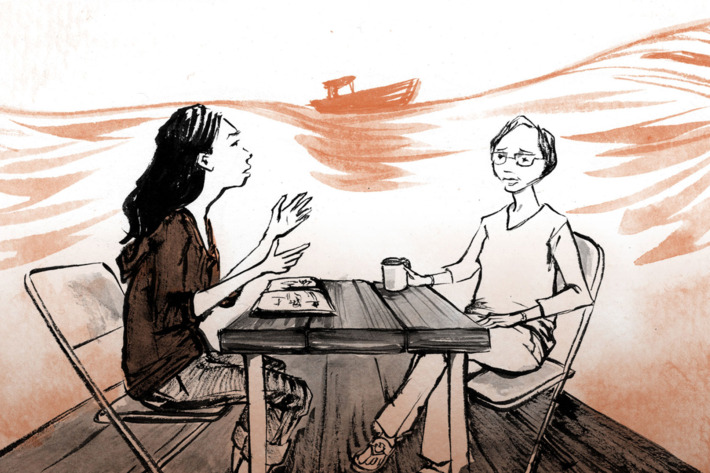
“The Best We Could Do” by Thi Bui
Quinton Bent
Written by Thi Bui, The Best We Could Do is an autobiography about the life of Thi Bui. This story opens up with the grueling and complex birth of Bui’s child in New York City in 2005. Following the birth, Bui lies on the hospital bed, exhausted, and comes to the realization of what exactly just happened, “Family is now something I have created–and not just something I was born into. The responsibility is immense. A wave of empathy for my mother washes over me.” It was at this moment that Bui came to appreciate all the hard work and sacrifices her mother endured to make sure she was alright.
The majority of the story following the birth of Thi Bui’s child delves into the history of her father, mother, and siblings who lived in war-torn South Vietnam before leaving for America in 1978 when Bui was three years old. Despite her family surviving catastrophic events, the emotional baggage and culture shock of the different lifestyle serves to damage her family. This damage results in miscommunication and misunderstandings between each generation’s parents and their children.
In Bui’s early twenties, she flew back to Vietnam to meet her extended family for the first time. Soon after, she starts to record her family’s history in hopes that, “if I bridge the gap between past and present… I could fill the void between my parents and me”. Bui’s story continues to go back and forth throughout time, depicting how big events such as war, immigration and a dictator shaped their families lives. Bui writes about the traumatic childhood of her father (Daddy). Contrary to Bui’s father, her mother (Ma) grew up in an upper-class home where her parents were civil engineers. After marrying Daddy, Ma gave birth to many children, usually under extremely harsh and adverse conditions.
The parts of the narrative which describe the history of Vietnam and the war are painful to read but at the same time, very powerful. Bui basically offers a crash course into the history of the long, tragic, and dark Vietnam War, from the dark roots of its origin to the awful aftermath under oppressive dictatorship. One point in the novel, Bui delves into how happy her parents were after their wedding. They were living on two very large incomes with a bright foreseeable future. Little did they know that forces outside of their control were pointing toward mega destruction and death. Bui writes, “By this time, the chess pieces of the war had been set. It was 1965”. Bui’s story is very straightforward and direct; when talking about the worst events, she continues to fill her family story with elegance and power.
Bui’s family fled the oppressive Communist rule following the war with a group called “boat people”. Unfortunately, this was not the end of their struggles. Upon arriving in America, along with the obvious change of culture, they were forced to live with “bitter” social and economic downsizing. The educational degrees that Bui’s parents received in Vietnam were not recognized in the strange new land of America. This forced them to work long hours at minimum wage while attending night school to better their economic standing. In this story, Bui describes every last detail of these blighted early years, such as being stuck at home with her dad in a San Diego apartment while Ma is at work and her sister are at school.
Early on, Bui describes the anger she felt towards her initial plan to tell her family’s story. Using a series of text with some pictures she says,
I didn’t feel like I had solved the storytelling problem of how to present history in a way that is human and relatable and not oversimplified. I thought turning it into a graphic novel might help.
While on the internet Bui is the self-proclaimed, “slowest cartoonist in America,” she is very talented at page layouts and delivering information precisely and creatively.
As the story comes to an end, Bui turns her attention to her now, ten-year-old son. She wonders if the pain which has been passed down from her parents will be passed down to him. Bui is left with the question of “whether I would pass along some gene for sorrow or unintentionally inflict damage I could never undo”. Bui does, however, remind us that life is random and that relationships are not always held together by destiny but by free will, and sometimes crazy events that we cannot control.
At a time when America is undergoing an immigration crisis, the 2017 publication of The Best We Could Do couldn’t have been better timed or more appreciated. Bui’s story puts human faces to the stories we hear all the time on the news about the new arrivals to our country. Despite current popular sentiment, immigrants are not just statistics; they are people—more than the sum of their homelands and more than the colour of their skin. Bui shows the real uncensored, traumatic accounts that many families endure when they are forced out of their home country and forced to move to an unknown land.